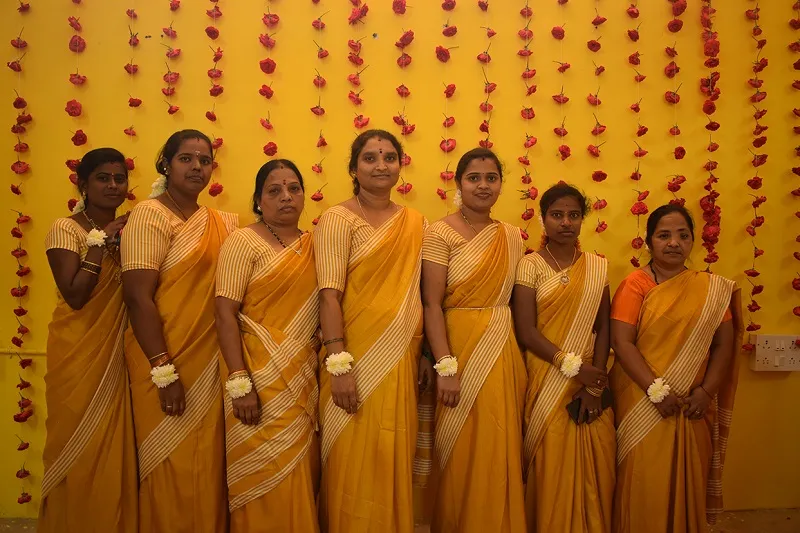How sisters Rhea and Yeshoda Karuturi are revolutionising the pooja flower industry with Hoovu Fresh
Coming from a family with a thriving flower business, sisters Rhea and Yeshoda Karuturi found their niche in bringing a subscription for pooja flowers. In this conversation with HerStory, they detail their journey and the road ahead.
Bengaluru-based Yeshoda Karuturi (28) and Rhea Karuturi (25) grew up in the midst of flowers as when Yeshoda was born, their father, Ramakrishna Karuturi started a rose farm in Ethiopia. As the Karuturi rose business grew over the last two decades expanding the business to Kenya and India as well, Rhea and Yeshoda observed its success with keenness.
“Our father started his first rose farm the year Yeshoda was born. He grew that 3-acre farm into the world’s largest rose farm in the span of a decade and we got to be in the front seat watching it happen,” Rhea and Yeshoda tell HerStory.
Family business inspiration
Belonging to a family business excelling in selling flowers, floriculture was an obvious choice for the sister-duo. They found an opportunity in selling pooja flowers via online channels. Yeshoda and Rhea started Rose Bazaar in 2019, which they renamed in mid-2020.
“We both also worked in our family business after graduating college and this gave us an even closer perspective on how big the flower industry is. What shocked us though is that pooja flowers — a quintessential Indian use case — were missing from this picture. While the bouquet flower industry has grown by leaps and bounds, the pooja flower industry has remained largely unchanged for the past three decades,” the Co-Founders say.
Rhea has a Bachelor in Science, Technology and Society from Stanford University and Yeshoda has a Master’s in Accounting and B.S in Business Administration from Washington University in St. Louis, USA. After completing her studies she worked in the family business, handling overseas operations in East Africa.

Rhea Karuturi and Yeshoda Karuturi
Starting Hoovu Fresh
Hoovu means flowers in Kannada and the sisters wanted their brand to be uniquely Indian. “When people think of pooja, they think about it in their mother tongues - and we felt Hoovu was a nice way to pay homage to tradition while staying fresh,” says the duo.
They note that the pooja flower industry in India is four times the size of the bouquet flower industry and when they started researching their product, they instantly knew it was going to be a big hit.
“Although this is a small wallet spend, the emotional quotient is very high and we’ve found that once customers use our flowers, there’s no going back for them. Our customer love is how we knew this would be a success,” they share.
Since flowers are highly perishable, every minute from when they are picked to delivered is important. Hoovu says it has been able to increase its flowers’ shelf life from two-to-three days to 15 days.
Hoovu has 50 flower SKUs ranging from loose flowers to intricate garlands to greens such as Durva grass that are used in pooja. The prices start from Rs 25 and go up to Rs 1000.
“From day one, we focused on building a strong supply chain and working with farmers to ensure we receive the highest quality produce,” they share, adding that their team is 90 percent women.
Rhea and Yeshoda add, “When the whole world is going after India’s grocery stores, we are able to go after the ignored last mile in India – the millions of women who work as street vendors and their baskets, which startups are still to touch.”
Pooja flower monopoly
Hoovu Fresh enjoys monopoly in the ecommerce market in selling pooja flowers and sells their range of assorted flowers through marketplaces like Big Basket, Blink it, Fresh to Home, Zepto, Dunzo, Milk Basket, Supr Daily, Jio Mart, Zomato, Swiggy and more.
As the startup was launched right before the country went for its first lockdown in March 2020 due to coronavirus, it suffered a slow down when the first lockdown was announced. However, it also learned that the lockdowns are only going to promote their business as more and more people switch to online platforms for all their basic necessities.
They further add more people were looking for a company they could trust to sanitise the flowers and get them to them in a safe way. Hoovu introduced zero-touch flowers using their flower packing machine.
Despite two years of economic slowdown, Rhea and Yeshoda say that they have seen a 10x growth in the past year and currently service 150,000+ orders per month.
They currently service Bengaluru, Hyderabad, Chennai, Mysore, Pune, Mumbai, Gurgaon and Noida and their agarbattis are available pan-India and they serve pan-India during festivals.

Hoovu Fresh promotional picture
“We plan to bring our daily subscriptions pan India through our partner platforms and grocery stores,” say the sisters.
While Yeshoda and Rhea started their business with an angel investment of Rs 10 lakhs which they used in getting their first 1000 subscriptions, they raised a funding amount of $120,000 as part of the Techstars accelerator programme.
Having run a business in the pandemic and witnessing a range of unicorn startups spring up in just the last year, the sisters are hopeful about the Indian startup ecosystem.
They add, “To be standing on the shoulders of these giants is a privilege and we are excited to add to this legacy. Post the pandemic, I think it’s safe to say that Bharat is moving online and there’s no turning this wave around. What more could young entrepreneurs ask for?”
Edited by Affirunisa Kankudti



![[Sustainable Agenda] This initiative is making incense sticks out of flower waste](https://images.yourstory.com/cs/5/79900dd0d91311e8a16045a90309d734/MHDPfeat-1644412342864.jpg?fm=png&auto=format&h=100&w=100&crop=entropy&fit=crop)





